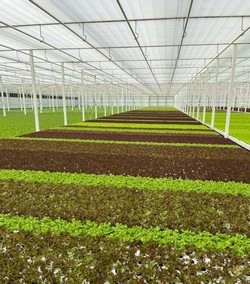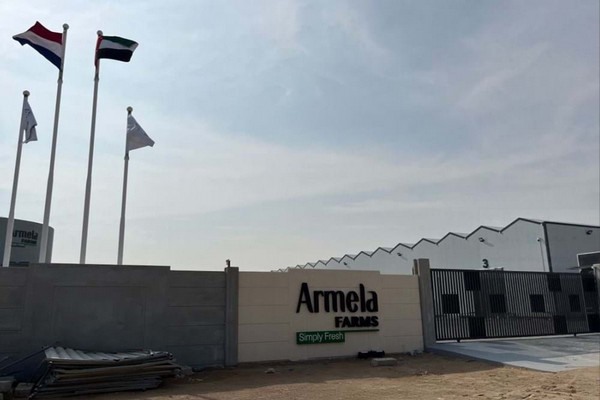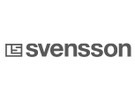With its hydroponic cultivation of pesticide-free red and green lettuces, Armela Farms is on a mission to promote healthy living in the United Arab Emirates by offering consumers fresher, tastier, and longer-lasting greens. The high-tech greenhouse, designed and constructed by Van der Hoeven, includes Svensson's unique PARperfect double-screen solution. Yazan Abu Jaish, COO of Armela Farms, explains how this technology supports the sustainable, year-round production of 4.5 tonnes of premium-quality and uniform lettuces per day.

The middle of the desert might not seem the most logical choice when looking for a location to cultivate lettuces. Nevertheless, Armela Farms opened a 30,000m2 high-tech greenhouse – including 17,000m2 of production space and a 13,000m2 service area for propagation, packaging, logistics, and control systems – near Abu Dhabi, United Arab Emirates (UAE), in June 2023.
"I have been operating several low-tech farms producing leafy greens and other crops in the United Arab Emirates (UAE) since 2010. However, low-tech farms can only produce good-quality crops in our winter, from November to April, when the daytime temperature is 25-30 ⁰C. In our summer, from May to October, daytime temperatures can reach 45-50 ⁰C with up to 70% humidity," says Yazan Abu Jaish. "This makes it very difficult to provide a year-round supply of fresh produce for retailers, wholesalers, and consumers. Therefore, our region is very reliant on imports making food security a hot topic here in UAE, and in the Gulf Cooperation Council (GCC) as a whole."
"In parallel, since the Covid pandemic, consumers have been increasingly focused on healthy eating habits. We had already proved that we could produce crops in a low-tech system thanks to our know-how and a good team of people. This encouraged us to set up a high-tech greenhouse so that we could expand our product range and volumes to meet the growing consumer demand for high-quality, fresh, healthy, tasty, long-lasting lettuces all year round," he adds.

He spent more than a year researching the market for potential technology suppliers.
"I'd read the Plant Empowerment book and had a clear idea of which companies were leading the developments. I visited the Netherlands several times and met with various companies. In the end, I chose a group of suppliers who had worked together successfully on similar projects before, including in Canada, the USA and Japan." Those companies included Svensson, Hoogendoorn, LetsGrow, Koppert, Rijk Zwaan, and Jiffy.
Close collaboration
Van der Hoeven Horticultural Projects coordinated the design and construction of the turnkey greenhouse. The result is a fully automated and robotized operation, from seeding and transplanting to shifting and harvesting, producing an average of 4.5 tonnes of green and red lettuces daily. "And we do this with just 25 workers, whereas at a typical low-tech farm we need 45 workers to produce just 500kg per day," he says .
This impressive outcome is thanks to close collaboration between the technology suppliers and also Yazan himself. As a qualified and experienced agronomist, he already had a clear idea of what was necessary to achieve the results he wanted.
"Unlike many investors who often see a high-tech greenhouse purely as a business venture, I had first-hand knowledge and experience in low-tech cultivation. Therefore, I was aware of the challenges and what was needed to optimize the microclimate inside the greenhouse. This enabled us to reach agreement on the final specifications together," he says.
"For example, we had initially planned to install a single screen from Svensson. During a Plant Empowerment seminar, however, I heard about Svensson's new PARperfect screen solution and I immediately realized it would make my life a lot easier and better. And I was right."

Energy savings
In this double-layered screen solution for both shading and energy savings, Svensson's Harmony 5747 FR and Harmony 2047 FR VK screens are combined.
"In the winter, when nighttime temperatures sometimes drop to as low as 2 ⁰C, we can close both screens to block outgoing radiation, and it is enabling us to save around 60% on heating. And in the summer, the screens help to keep the greenhouse cooler so that our mechanical chillers and air dehumidification units don't have to work so hard. So as well as helping me to manage the microclimate for the plants, this also supports our sustainability goals," comments Yazan.
This is important for the company, which prides itself on recycling 100% of its water. "Not a single liter is wasted. The only water that leaves our farm is via the lettuce!" he adds.
Constant light level
"Additionally, PARperfect gives me precise control to maintain the constant light level needed for uniform production quality and quantity. This is important because, as a short-cycle crop, lettuce is sensitive to sudden conditions changes, " says Yazan.

"For us, it's all about balancing the Radiation to Temperature Ratio (RTR). We have a harsh climate, with high outdoor temperatures, high humidity and photo periods of 11 hours in the winter and up to 15 in the summer. We work with a target PAR sum of 17µmol/m2/sec, equivalent to 650µmol of light. This enables us to work with a relatively high indoor temperature: an average of 18 ⁰C, although this can sometimes go as high as 26 ⁰C depending on the external conditions. Svensson's screening technology enables us to consistently maintain our setpoints from the first day of the cycle right through to the last," he explains.
This is because the two screens in the PARperfect solution work together in harmony to diffuse the light and compensate for any gaps in shading. To ensure that all the plants are consistently exposed to the exact same light level and microclimate every single moment of every day, the mechanized screens are controlled automatically by the PARplus software running on the Hoogendoorn climate computer.
"Every day, we harvest 18,000 good-quality, compact lettuce heads with a uniform weight and no tip burn or browning. I would not be able to do that using a single-screen setup," adds Yazan.
Expert advice and support
The COO is impressed with the support he has received from Svensson, both during and after the installation of the screens: "Besides being available by phone and email, the consultant visits us regularly. We've built a relationship that is not just business; it's more like a friendship based on a shared passion for excellence. We sit together, analyze all the historical climate data and discuss how we can make further improvements by fine-tuning the settings, sometimes in consultation with the technical specialists from Van der Hoeven, Hoogendoorn and LetsGrow. That's the beauty of working with the right suppliers who also collaborate with one another regularly. His expert advice has helped us to reach the optimal light level for the plants to achieve consistently optimum production all year round. In fact, the product quality in summer is now even better than in winter!"

Expansion plans
Now that Armela Farms can produce premium-quality full-head lettuces all year round, it has secured supply agreements with major clients including grocery retailers such as Carrefour, Spinneys and LuLu, as well as supplying to leading hotels and restaurants through wholesalers and catering suppliers. It currently has a 75% share of what is locally produced for the UAE market. "However, that's only 4% of the total consumption; the rest is still imported, so there is still clearly a lot of potential for further growth in this market," says Yazan. Needless to say, we're looking forward to working with Svensson and the other partners on these future projects," he concludes.
For more information:
Ludvig Svensson
info@ludvigsvensson.com
ludvigsvensson.com
